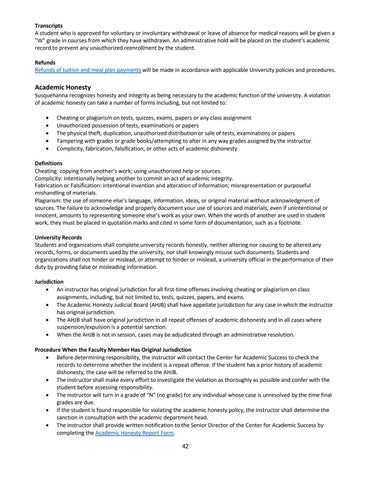Transcripts A student who is approved for voluntary or involuntary withdrawal or leave of absence for medical reasons will be given a "W" grade in courses from which they have withdrawn. An administrative hold will be placed on the student's academic record to prevent any unauthorized reenrollment by the student. Refunds Refunds of tuition and meal plan payments will be made in accordance with applicable University policies and procedures.
Academic Honesty
Susquehanna recognizes honesty and integrity as being necessary to the academic function of the university. A violation of academic honesty can take a number of forms including, but not limited to: • • • • •
Cheating or plagiarism on tests, quizzes, exams, papers or any class assignment Unauthorized possession of tests, examinations or papers The physical theft, duplication, unauthorized distribution or sale of tests, examinations or papers Tampering with grades or grade books/attempting to alter in any way grades assigned by the instructor Complicity, fabrication, falsification, or other acts of academic dishonesty
Definitions Cheating: copying from another’s work; using unauthorized help or sources. Complicity: intentionally helping another to commit an act of academic integrity. Fabrication or Falsification: intentional invention and alteration of information; misrepresentation or purposeful mishandling of materials. Plagiarism: the use of someone else’s language, information, ideas, or original material without acknowledgment of sources. The failure to acknowledge and properly document your use of sources and materials, even if unintentional or innocent, amounts to representing someone else’s work as your own. When the words of another are used in student work, they must be placed in quotation marks and cited in some form of documentation, such as a footnote. University Records Students and organizations shall complete university records honestly, neither altering nor causing to be altered any records, forms, or documents used by the university, nor shall knowingly misuse such documents. Students and organizations shall not hinder or mislead, or attempt to hinder or mislead, a university official in the performance of their duty by providing false or misleading information. Jurisdiction • An instructor has original jurisdiction for all first-time offenses involving cheating or plagiarism on class assignments, including, but not limited to, tests, quizzes, papers, and exams. • The Academic Honesty Judicial Board (AHJB) shall have appellate jurisdiction for any case in which the instructor has original jurisdiction. • The AHJB shall have original jurisdiction in all repeat offenses of academic dishonesty and in all cases where suspension/expulsion is a potential sanction. • When the AHJB is not in session, cases may be adjudicated through an administrative resolution. Procedure When the Faculty Member Has Original Jurisdiction • Before determining responsibility, the instructor will contact the Center for Academic Success to check the records to determine whether the incident is a repeat offense. If the student has a prior history of academic dishonesty, the case will be referred to the AHJB. • The instructor shall make every effort to investigate the violation as thoroughly as possible and confer with the student before assessing responsibility. • The instructor will turn in a grade of “N” (no grade) for any individual whose case is unresolved by the time final grades are due. • If the student is found responsible for violating the academic honesty policy, the instructor shall determine the sanction in consultation with the academic department head. • The instructor shall provide written notification to the Senior Director of the Center for Academic Success by completing the Academic Honesty Report Form.
42

